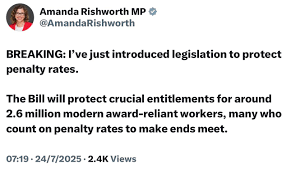Penalty Rates Bill Passes House; What Employers Need to Know
- Tim Dive

- Aug 1, 2025
- 4 min read
Author: Tim Dive, Director.
The Federal Government’s proposed Fair Work Amendment (Protecting Penalty and Overtime Rates) Bill 2025 has now passed the House of Representatives. While the Bill claims to protect penalty and overtime rates in modern awards, employers should take note:
The Explanatory Memorandum and the Bill’s language raise serious questions about legislative overreach, ambiguity, and potential consequences for workplace flexibility.
Following are my key concerns and criticisms of the Explanatory Memorandum to the Fair Work Amendment (Protecting Penalty and Overtime Rates) Bill 2025, from an employer and IR practitioner’s perspective.
Simply put – the Minister’s justification lacks anything resembling genuine substance.

Key Issues Raised by the Minister, and Why They Don’t Justify the Bill
1. The Bill claims to “protect” existing penalty and overtime rates
Why it makes no sense:
There is already legal protection for these entitlements under existing award structures.
Section 134(1)(da) of the Fair Work Act already requires the Fair Work Commission (FWC) to consider whether additional remuneration is needed for irregular or unsocial hours.
The Better Off Overall Test (BOOT) and modern awards system already prevent reductions to penalty rates in practical terms unless offset by superior entitlements.
My concern: This implies employers are seeking to undercut penalty rates, when in reality, most employers are seeking nothing more than lawful simplification and certainty via loaded rates or enterprise agreements, already regulated by the FWC.
2. The Minister targets “rolled up” or “loaded” rates as loopholes
Why it’s misleading:
"Rolled up" or "loaded" rates are already subject to award compliance, BOOT (for agreements), and FWO scrutiny.
Individual Flexibility Agreements (IFAs) already allow for tailored pay rates that meet or exceed award entitlements.
The “loophole” language is political framing, not a genuine legal concern.
My concern: This Bill (despite Amanda Rishworth’s clumsy justification) risks removing flexibility and encouraging complexity in payroll by forcing employers to track and pay discrete penalties, even where consistent higher flat rates would benefit both parties.
3. The Bill presents itself as compatible with human rights under the ICESCR
Why it overreaches:
The claim that this Bill is required to satisfy “just and favourable work conditions” is unsupported by any legal failure of the current system.
There’s no evidence that the Australian system violates these international standards or that employees are not compensated for unsocial hours under existing law.
My concern: Using international treaties as the justification seems unnecessary and suggests an ideological motivation rather than a legislative gap.
4. No new obligations apply to enterprise agreements… yet the effect will be chilling
Why this is important:
The Bill says it doesn’t touch enterprise agreements, but the Explanatory Memorandum admits it will make approvals harder, particularly for agreements with “all-up” rates.
Employers who genuinely want to bargain, may be deterred from bargaining if the BOOT becomes unpredictable under this new principle.
My concern: The legislation may cause legal uncertainty and limit innovation in agreement-making by embedding inflexible interpretations of “penalty protection.”
5. There is no evidence presented of harm or widespread misuse
Why this undermines the Bill:
The memorandum does not cite a single example where employees have been underpaid due to “rolled up” rates under a modern award.
The illustrative example (car parking) is entirely hypothetical and constructed to fit the argument.
My concern: Again, as we consistently see from the ALP, this Bill appears to be a solution looking for a problem, creating unnecessary legislative constraints without evidentiary basis.
6. The Bill gives new binding weight to a “principle” outside the normal modern awards objective
Why that’s significant:
The FWC already weighs multiple factors in s134(1) when varying awards.
The new Section 135A introduces a rigid principle after the award objective has been applied, which can override nuanced or contextual industrial reasoning.
My concern: This inserts ideological weighting into an independent tribunal’s discretion, potentially skewing outcomes in favour of fixed-rate ideology rather than flexible solutions.
7. The Bill expressly applies to “on foot” applications before the Commission
Why this is unusual:
It attempts to influence existing live cases by shifting the legal framework retrospectively for those not yet decided.
This Bill is an obvious attack on employers, specifically, the Business NSW application before the Commission right now.
My concern: It undermines confidence in procedural fairness for employers mid-way through legitimate applications.
All employers should be on high alert with Bills such as these.
With no precedent or reasons citing real-life cases it attempts to avoid, and no reasonable other justifications for introducing the Bill in the first place, it is an obvious pre-emptive strike against employers accessing lawful pathways to improve productivity and simplify extremely complicated workplace regulations.




Comments